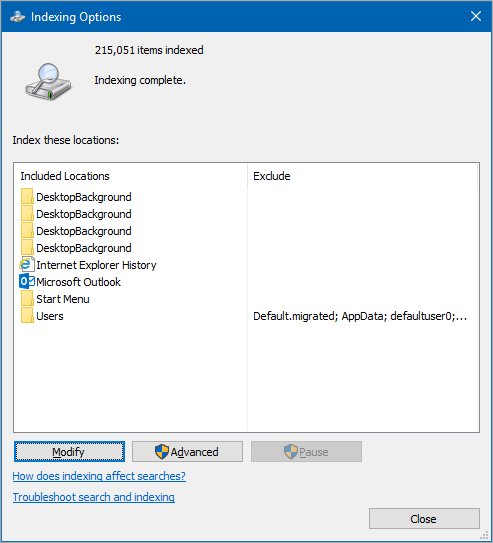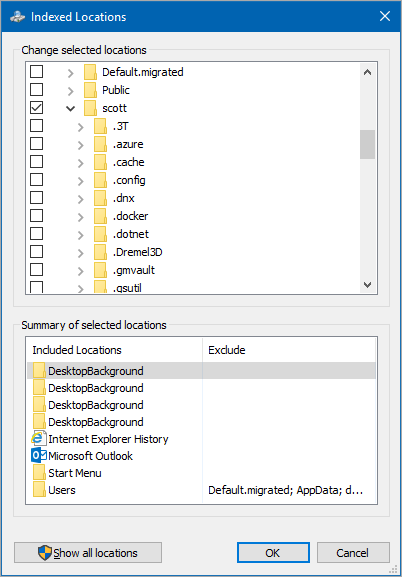Audit and Optimize your Windows 10 Search Indexing Options
I was getting frustrated with the speed (or lack of) of Windows Search within Windows 10 lately. I went over to my Indexing Options - just hit Start and type Indexing Options - and was surprised to see that there was over 1.5 MILLLION items indexed! That seems like a big number. Why so large?
I checked my "index these locations" list and didn't see anything weird, but I did note that Indexing does include c:\users\YOURNAME by default. That seems reasonable, because it is reasonable.
However, I also noted that I had a LOT of ".folders" (dot folders) under my C:\users\YOURNAME folder adding up to a few gigs of config text files, caches and general crap.
I was able to significantly lower the number of items indexed from over a million to a reasonable 215k items just by excluding (un-checking) folders that I knew didn't matter to me as much.
Go to Indexing Options and click Modify:

Go to your C drive (or wherever ~\YOURNAME is) and go to your top level User folder. I unchecked a bunch of the stuff that didn't matter to me.

For average users this won't matter, but for developers who install a bunch of utilities, have their Dropbox or OneDrive in the c:\users folder, a 5 min audit of your indexed files can give your Indexed Files a nice refresh.
Sponsor: Check out JetBrains Rider: a new cross-platform .NET IDE. Edit, refactor, test, build and debug ASP.NET, .NET Framework, .NET Core, or Unity applications. Learn more and get access to early builds!
About Scott
Scott Hanselman is a former professor, former Chief Architect in finance, now speaker, consultant, father, diabetic, and Microsoft employee. He is a failed stand-up comic, a cornrower, and a book author.
About Newsletter
When developers apply the Linux guidelines to storing user specific application data to Windows you are not only littering personal folder space with strange folder names (that by the way are nicely hidden on Linux); you also get a bad search experience as you have explained. The proper place to store this data is in ~\AppData which by the way is not included in the search index (as can be seen in the screenshot).
And looking at all the “dot-folders” on my machine it seems that DevDiv is the biggest offender when it comes to not being a good Windows citizen...
Interesting that you bring this up, looking at my own user folder the biggest offenders are .nuget, .vs and .vscode (and a leftover from .dnx).
Are you suggesting that Microsoft's own developer tools developers aren't following developer guidelines?
Are you suggesting that Microsoft's own developer tools developers aren't following developer guidelines?
Yes, when I wrote DevDiv I meant Microsoft's Developer Division. As I'm not an insider I don't really know if that is the correct term. And sorry for the rant because I love their products but I'm disappointed when Microsoft products doesn't play well with Windows (and this is not the only example).
Hear, hear. It was bad enough when ports of popular open source software did it, but these days the biggest culprits are the Developer Division. Come to think of it, the *only* Microsoft software that plays reasonably well with the Windows guidelines is Microsoft Office, and that too not always. Heck, even *Windows* (10) sometimes doesn't.
Makes me think that there are very few people left who care about Windows any more - even within Microsoft.
- Use better naming conventions for folders you're writing to user directories.
- Not use the user's directory for stuff that doesn't belong there.
It's also sort of mind-boggling how bad Windows search remains in 2017. Google can search a trillion documents in a few milliseconds but Windows takes minutes to search my hard drive, and the start menu constantly hangs while typing into it. Windows has just about the worst search capability of any product I use.
I think windows search need more improvements
I also use Agent Ransack when I want to search the contents of the file.
I agree that it's astonishing that it's a feature which has been continuously broken in every single version of Windows since 95. The only comparable feature for longevity-of-fail is F1 help in Visual Studio, and that did actually sort of work up to the late 1990s.
As of 2017 i'm still scared to make serious jumps in the cloud for the moltitude of services and terms that overlaps, mixed with a floating cost.
Articles like that are not enough to cancel my fears but are a great push in the right direction, and with concrete example, few words and some screenshot you were, as usual, very very clear.
Thanks!
Also, some file types are configured by default to use the XML filter, but that only indexes the tag contents. For file types like .aspx, .xml, .xsl, etc. I change the filter to be the Plain Text Filter, so that tag names are also indexed.
What might be a nice feature... have a facility in Visual Studio to have it configure Windows Indexing for all of the file types that are registered for Visual Studio. (I should probably submit a Feedback post.)
Regards,
Paul
Comments are closed.
